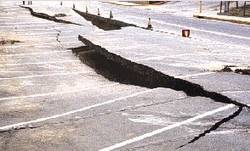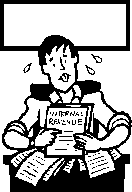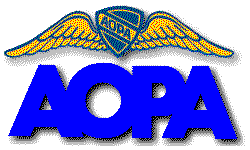It's Time to Get in Line, for FAA Certificate-Holders
We let you know, courtesy an ANN News-Spy, that
Washington state is cracking down on scofflaw pilots,
mechanics, and other FAA certificate-holders (with broad
exceptions). Here's more of what's behind the move. We talked with
the state's DoT, and got a lot of information from Ms. Theresa
Smith:

"What the legislature recenty did -- last Sunday," she started,
but then wanted us to know that, "We have 129 public-use airports;
about 90 are solely dependent on state money to maintain them. We
have 16 airports that we're at risk of losing, due to lack of
funds. The pavement is failing -- they're becoming unusable."
The state will be in trouble if it loses these important aerial
links -- and the DoT will take a lot of heat. There's a new
director of the state's Transportation Department, and he's
suddenly aware of how much trouble he'll be in, if a dozen or so
airports close on his watch. The state doesn't have the funding to
do the required repairs, repairs the old administrator apparently
think were critical. So, now, it's a crisis.
 "We have about a $7 million gap in funding
for pavement, just to maintain our current pavement," Ms. Smith
told us. "We have a new state DoT Director, who wants to make sure
folks know of the pavement condition. We want our customers to let
us know what to do." There are alternatives, but they're not
pleasant. She explained, "'Doing nothing' is one of the decisions
that can be made."
"We have about a $7 million gap in funding
for pavement, just to maintain our current pavement," Ms. Smith
told us. "We have a new state DoT Director, who wants to make sure
folks know of the pavement condition. We want our customers to let
us know what to do." There are alternatives, but they're not
pleasant. She explained, "'Doing nothing' is one of the decisions
that can be made."
The new administration had to get right to it: "If we have
facilities that are at risk, what are the funding sources; and can
the community survive without medical, blood, pharmaceuticals,
checks -- all the things that the communities need so badly," and
that the airports support or provide. Washington is a big state,
and it's largely sparsely populated. Its economy is also moving
from mostly-agricultural, to manufacturing and services. Ms. Smith
understands that: "The state has a lot of transitional economic
activity, and the airports are critical to supporting that
transition."
Taxes are going up.
"The pilot community was polled in the last legislative
session," she told us. "We increased the state tax on fuel, and
it's variable. Six months ago, it was 7 cents, and it's now at
seven and a half cents [a gallon]; it's not good to try plan
budgets around [a variable tax]. With the desire to keep these
facilities alive, we will soon -- July 1 -- we will have a 10 cent
fuel tax. We'll still be way short of the millions needed."
Mostly, the tax isn't collected.
 Ms. Smith said that the burden isn't
shared evenly, though. In fact, most of the heavy users -- those
whose activity most impacts the repair bill -- are exempt from
paying the tax! "Within Washington state," she noted, "95% of the
fuel users -- just about everybody but small GA, are exempt from
the 10 cent a gallon tax." We asked for an example. "Within a
two-year period, 564 million gallons were exempt; 46 million
gallons were taxed," she told us. Who's exempt? "Commercial
service, farm, research, testing, and training -- and all
government." Who causes the most wear and tear on airports? Um...
light GA?
Ms. Smith said that the burden isn't
shared evenly, though. In fact, most of the heavy users -- those
whose activity most impacts the repair bill -- are exempt from
paying the tax! "Within Washington state," she noted, "95% of the
fuel users -- just about everybody but small GA, are exempt from
the 10 cent a gallon tax." We asked for an example. "Within a
two-year period, 564 million gallons were exempt; 46 million
gallons were taxed," she told us. Who's exempt? "Commercial
service, farm, research, testing, and training -- and all
government." Who causes the most wear and tear on airports? Um...
light GA?
We asked for it, she said.
So now, there';s this move to hit FAA certificate holders with
registration and an $8 registration fee, plus the tax for small
operators is going up by 33%. How the heck did that happen? "What
has happened -- it was the pilot community that called for stiffer
penalties -- just 1/3 of pilots and 1/2 of the aircraft were
registered." So nobody was collecting taxes and fees. "Part of that
was poor communication on our part," Theresa admitted. It's getting
better, though. As certificate-holders now face criminal penalties,
and are allowed to pay by credit card, things look to be on the
improve... "With the 'credit card' option, we're now at 45% of the
population using it," she said.
We wanted to know just what 'pilot community' was pressuring the
DoT to raise taxes and collect more fees. "The 'pilot community'
was just 'those pilots who were registered,'" she explained, "just
1/3 of the pilots. We hooked up with the AOPA, Washington Pilots'
Association, and the EAA -- they have remarkable networks." She
thinks that, if pilots believe her organization, they will rush to
put more money into the state's treasury: "All the increases will
go directly to airport preservation. We are trying to prevent the
loss of facilities," she pleaded.
We asked AOPA.
 A quick call to the AOPA, asking just why
it seemed like a good idea to raise taxes on such a small
percentage of Washington pilots, the very pilots AOPA best
represents. The answer was that, since the state now promised to
use aviation taxes to support aviation projects, it seemed like a
good idea, somehow. We're waiting for an official position
statement from AOPA, that explains why, after fifty+ years of
collecting aviation taxes and neglecting aviation facilities,
suddenly we should believe the government when it says the aviation
tax increases are for our own good -- and most of the increases
won't be collected from favored groups, anyway.
A quick call to the AOPA, asking just why
it seemed like a good idea to raise taxes on such a small
percentage of Washington pilots, the very pilots AOPA best
represents. The answer was that, since the state now promised to
use aviation taxes to support aviation projects, it seemed like a
good idea, somehow. We're waiting for an official position
statement from AOPA, that explains why, after fifty+ years of
collecting aviation taxes and neglecting aviation facilities,
suddenly we should believe the government when it says the aviation
tax increases are for our own good -- and most of the increases
won't be collected from favored groups, anyway.
We asked EAA.
 We kinda surprised EAA's Dick Knapinski,
who didn't realize that the organization's name had been invoked in
pursuit of higher fees from a lot of the EAA's members. He looked
into it, and got back to us, when he found out what he needed to
know about this program. "Whoever told you that EAA was 'in favor
of a tax increase' was misinformed.," he told us. "Whatever was
taken from aviation, should have gone to aviation. Additionally, we
see a lot of exemptions -- 95% of the users are
exempt, and many receive a tax rebate. They have to find some way
to have an equitable burden. If you're a GA pilot out there, you're
conflicted -- you may not want to pay any more tax, or fees -- or
you might be glad to 'contribute' to airport maintenance. The
question is, how will this be equitable, for all who use the
airports? Will those 'exempt' entities, for instance, pay
landing fees? How do you make it fair, across the board?" Getting
back to basics, "Are we in favor of a tax or fee increase? No. Are
we interested in how airports can be kept open? Absolutely."
We kinda surprised EAA's Dick Knapinski,
who didn't realize that the organization's name had been invoked in
pursuit of higher fees from a lot of the EAA's members. He looked
into it, and got back to us, when he found out what he needed to
know about this program. "Whoever told you that EAA was 'in favor
of a tax increase' was misinformed.," he told us. "Whatever was
taken from aviation, should have gone to aviation. Additionally, we
see a lot of exemptions -- 95% of the users are
exempt, and many receive a tax rebate. They have to find some way
to have an equitable burden. If you're a GA pilot out there, you're
conflicted -- you may not want to pay any more tax, or fees -- or
you might be glad to 'contribute' to airport maintenance. The
question is, how will this be equitable, for all who use the
airports? Will those 'exempt' entities, for instance, pay
landing fees? How do you make it fair, across the board?" Getting
back to basics, "Are we in favor of a tax or fee increase? No. Are
we interested in how airports can be kept open? Absolutely."
In the meantime, Washingtonians, line up, register, pay your
taxes -- and keep that credit card handy.
 Aero-News: Quote of the Day (12.18.25)
Aero-News: Quote of the Day (12.18.25) Classic Aero-TV: Viking Twin Otter 400--Bringing the DHC-6 Back Into Production
Classic Aero-TV: Viking Twin Otter 400--Bringing the DHC-6 Back Into Production NTSB Final Report: Rans Employee Flying Club Rans S-6ES Coyote II
NTSB Final Report: Rans Employee Flying Club Rans S-6ES Coyote II ANN FAQ: Submit a News Story!
ANN FAQ: Submit a News Story! ANN's Daily Aero-Term (12.18.25): Braking Action Advisories
ANN's Daily Aero-Term (12.18.25): Braking Action Advisories







